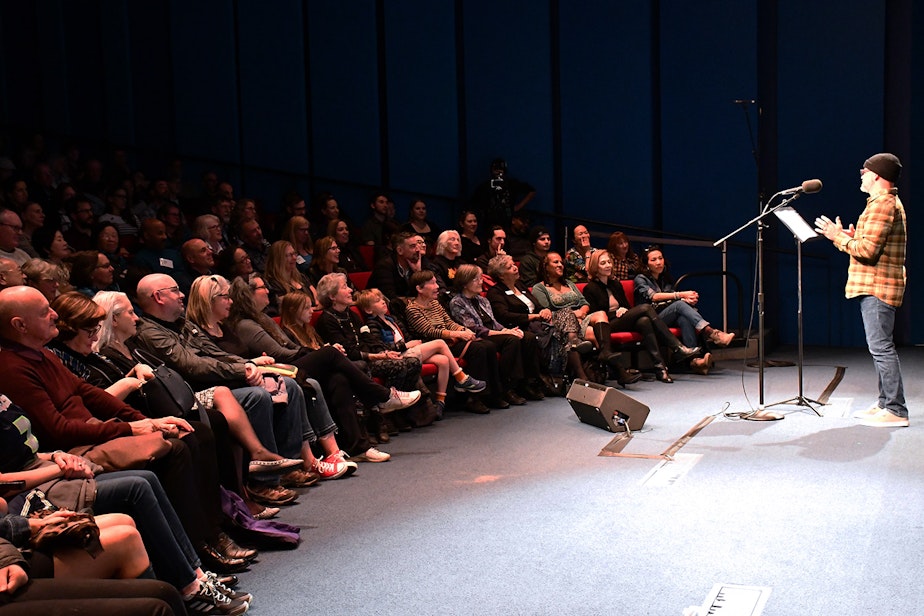Looking an orca in the eye: 'The closest thing to alien contact I may ever know'

It was a clear and cold winter day. Alone on my paddle board, I had what seemed like the entire Salish Sea to myself.
I was far enough from land that I could not hear any of the shoreline sounds, and of course it was early, when the world is just a little quieter. It was the kind of calm where you could hear the beating wings of sea birds.
When in the distance, I heard a familiar sound: the blast and whoosh of air and water — the sound of a mammal breathing, the sound of a very large mammal breathing.
A flash of shimmering gloss black caught my eye.
Then another.
And another, followed by more blasts of air and water.
And there they were: a pod of eight orcas. I stopped and watched patiently and anxiously as they rose to the surface, travelling along in their family order.
Sponsored
Leading majestically was a large bull that dwarfed all others in the pod. Nearly 10,000 pounds and with a dorsal fin standing as high out of the water as I am standing tall right now. He seemed to saunter along, rising and breathing, rising and breathing, and began to steadily work his way closer to me.
He was now swimming past me from left to right at maybe 200 feet away. His pace slowed and his time at the surface grew longer. And then he rose again, exhaled, his body at the surface, dorsal fin standing tall and the ridge of his back reflecting the winter sunlight, and he stopped.
He stopped.
There was a certain slow motion effect to it all. The highlight reel in my head replays this moment often.
He stopped.
And I knew what had just happened. It was clear that not only was I aware of him, but he was now aware of me, too.
And that’s when that mighty black dorsal fin, standing almost six feet tall above the water, began to rotate at 90 degrees. Now this massive whale was facing me.
Sponsored
I took a deep breath as the he began to move forward, submerging, toward me.
There was absolutely nothing I could do now, except wait and accept whatever was about to happen next. It was just me, the sea and this mighty whale.
The fin vanished beneath the surface. And not far behind, the rest of the pod seemed to be on the same agenda. They were on their way.
Then the mighty bull's fin punched through the surface and a blast of air and water erupted immediately in front of me. The bull rolled to his side and swam right under me, staring up at me as he passed.

Sponsored
A moment later and water is splashing all around me: The rest of the pod has arrived and they have surrounded me.
Now they are jumping, breaching, slapping their tails and vocalizing. I can hear them. I can hear their whistles and clicks.
A mother and her young calf are circling me and come closer on each pass. A flash of white as another skims the edge of my board with her belly. Then the mother brings the calf up close enough that they both make eye contact with me.
Eye contact. This is the prize of a whale encounter.
Sponsored
This is not whale watching. This is now an experience for both the whale and the human. This is now an experience for these whales and for me. It is now our experience, together.
It is the closest thing to alien contact I may ever know and is summed up as simply making eye-to-eye contact.
To see that massive eye as it moves about, looking me up and down and right into my own eyes — it’s a look that seems to last a lifetime. It’s a look and a feeling I will never, ever forget.
And it’s an experience now that I’ve come to know many, many times. My story is not and should not be unique. But in a modern world, it is becoming rare.
To have experiences like this requires access to a healthy environment – something that is under constant pressure.
Many access points to places for such wild experiences were designated or protected long ago: national parks, state parks, wild lands — these are good things, treasured and, mostly, well protected.
However, there are far fewer success stories of recovery, rehabilitation or restoration that create new access to wild experiences.
But just maybe this is one such story where Tacoma, the city I call home, was able to make enough of a change that I and many others could begin to have access where access had not existed for more than a century.
I think the phrase, “If you build it they will come,” does not quite fit here.
I like this one: “If you make change, then lives will be changed.”
And when those whales come and we look into each other’s eyes, I am changed.
This story by Dean Burke, a resident of Tacoma, Washington, comes from a special event hosted by KUOW. On Friday, October 14, we gathered to enjoy "Stories from THE WILD" with eight stories presented in front of a live audience at Seattle's McCaw Hall.





